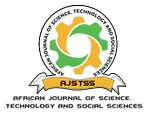IoT based smart irrigation system for communal use
DOI:
https://doi.org/10.58506/ajstss.v1i1.39Keywords:
IoT, Smart Irrigation systems, Soil moisture sensorsAbstract
Kenya is experiencing a rapid human population growth and consequently rising demand for food. This is happening at the backdrop of adverse climatic changes currently being experienced. The problem is further aggravated by the fact that more than 80% of the country’s landmass is classified as Arid and Semi-Arid Lands (ASALs). In order to meet the food demand, there is need to divorce from rain-fed agriculture and put most of the arable land under irrigation. Since Kenya is a water scarce country, efficient irrigation systems are required. An efficient irrigation system that promotes use of rain water harvesting technologies and maximizes crop water productivity through use of appropriate sensors and wireless communication technology has been developed. The innovation involves use of farmers’ earth pans for harvesting and storing rain water and irrigating fields through drip lines. In addition, smart soil moisture sensors are fitted to each field under irrigation for real-time monitoring of soil moisture content and automatically notifying an irrigation administrator through mobile phone when crops require watering. The administrator is equipped with a tricycle fitted with solar powered water pumping system for pumping water from the earth pan to the crops. When the operator receives a signal request from water sensors in field he/she moves with the tri-cycle and services it. The smart sensors (IoT based) installed in the field will then notify him/her when sufficient amount of water has been received so that irrigation can be stopped. The operator waits for the next request from another farmer’s field to service. The technology has been tested in different portions of the university land under irrigation. The results indicate that crops receive timely watering and show no water stress. The innovation has the potential of making high tech irrigation system accessible to small scale farmers at an affordable cost and enhance food production and in turn food security in the country.


